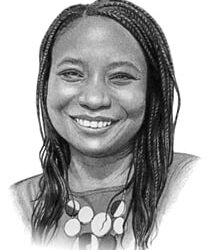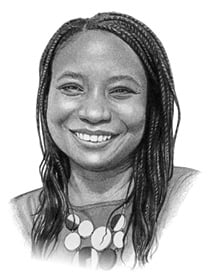China’s Chandeliers Are Full of Anacondas

Review
China’s Chandeliers Are Full of Anacondas
Perry Link’s essay collection finds meaning in silences.
A worker stands on a ladder near a giant chandelier at a hotel in Beijing on Oct. 19, 2011. Ng Han Guan/AP
China loves chandeliers. Every banquet room in China has at least one, usually as huge and shiny as possible. Like the caryatids that decorate the front gates of upmarket housing complexes or the (usually stopped) clocks labeled Paris, Rome, and New York behind hotel desks, they’re a lingering symbol of old-fashioned power and wealth.
The People’s Republic inherited the adoration of chandeliers from the Soviet Union, where they symbolized the grandeur of interwar Europe. But the Soviets made them ever larger, according to Nikita Khruschev, due to perverse economic incentives: Moscow’s chandelier factory was awarded bonuses for production by the ton, and it was easier to make a few massive chandeliers than many small ones.
China loves chandeliers. Every banquet room in China has at least one, usually as huge and shiny as possible. Like the caryatids that decorate the front gates of upmarket housing complexes or the (usually stopped) clocks labeled Paris, Rome, and New York behind hotel desks, they’re a lingering symbol of old-fashioned power and wealth.
The Anaconda in the Chandelier: Writings on China, Perry Link, Paul Dry Books, 287 pp., $24.95, February 2025
The People’s Republic inherited the adoration of chandeliers from the Soviet Union, where they symbolized the grandeur of interwar Europe. But the Soviets made them ever larger, according to Nikita Khruschev, due to perverse economic incentives: Moscow’s chandelier factory was awarded bonuses for production by the ton, and it was easier to make a few massive chandeliers than many small ones.
The ubiquity of the giant chandelier is part of what made Perry Link’s metaphor “The Anaconda in the Chandelier” instantly catch on among Sinologists when he introduced it in a 2002 New York Review of Books essay.
“In sum, the Chinese government’s censorial authority in recent times has resembled not so much a man-eating tiger or fire-snorting dragon as a giant anaconda coiled in an overhead chandelier,” Link, a renowned professor of Chinese literature and language, wrote at the time. “Normally the great snake doesn’t move. It doesn’t have to. It feels no need to be clear about its prohibitions. Its constant silent message is ‘You yourself decide,’ after which, more often than not, everyone in its shadow makes his or her large and small adjustments.”
That essay is at the heart of Link’s new collection of the same name, which gathers together some of his many writings over the last 20 years—seemingly unmarred by age. Most of the pieces come back to his consistent themes as a scholar: the joy of language, the silence of censorship, and the brutality of the Chinese Communist Party.
The first part of the book, “Captive China,” is a guide to navigating that brutality. Like many scholars of his generation, Link began as an admirer of Maoist China—until he was actually able to visit in the early 1970s. (“We tend to forget,” he notes in “Sixty Years of China Watching,” “that during the 1960s the US officially sent more people to the moon than it did to China.”) Link played an important role (which he modestly downplays himself) in helping dissidents escape after the Tiananmen Square crackdown.
A journalist speaks to the camera during the opening session of the Chinese People’s Political Consultative Conference at the Great Hall of the People in Beijing on March 3, 2015.Fred Dufour/AFP via Getty Images
But unlike some CCP critics, Link is also careful to distinguish between Mao Zedong’s China and Xi Jinping’s, both in the amount of information flowing out of China and in the possibilities available to Chinese people even after Xi’s crackdowns. Under Xi, after all, the coiled anaconda still presides over a banquet—a marker in China of both prosperity and officialdom. The people in its shadow are doing well, even as they never forget its presence. “Under Mao,” Link notes, “people usually believed what they were shouting, under Xi, they are often protecting their interests through outward performance.” The possibility of “an asphyxiating technofascism” lurks under Xi but is not fulfilled.
Link is also sharp on the divisions among exiles from China on issues such as support for U.S. President Donald Trump. Many dissidents saw him as a revolutionary figure thanks to his first administration’s willingness to confront Beijing; others saw him as an aspiring autocrat.
And in both the anaconda essay and other pieces, Link has a keen eye for the circumlocutions and uncertainty of both the party’s enforcers and its critics. The CCP, he notes, loves the “vague accusation,” which maximizes the possibility of fear and compliance.
As a result, even critics of the party living abroad often self-censor, worried about family or friends at home. So, he says, do “political scientists who study the Chinese government,” and “I have noticed the phenomenon in myself as well.” Criticisms end up muted or rendered through metaphor, and even outspoken critics of the party on one issue may choose silence on others.
Crowds surround the stage to watch traditional xiangsheng, a favorite Chinese folk art, during the Spring Festival in the Summer Palace in Beijing on Feb. 11, 2013. Zhang Peng/LightRocket via Getty Images
But this is not an unhappy book. A good number of Link’s essays are devoted to writers, to teachers he admires, to the “Joy of Teaching Beginning Chinese.” That joy is evident in his writing, especially his fascinating, quirky book An Anatomy of Chinese. Link loves the vernacular, as the great Chinese writers of the 1920s and ’30s did. He loves the stray poetry of slogans in toilets warning you to properly flush even if you’re in a hurry. (Congcong er lai, chongchong er qu—or “Enter rushing, exit flushing.”)
He loves the clever, bouncy rhymes of shunkouliu (“slippery verses”), the grassroots satires that spread by word of mouth in a pre-internet age, before they morphed into online memes. Several are included in the book’s first essay, on perceptions of corruption:
I worked my whole life for the Party
And had nothing at the time I retired.
Now they tell me to live off my kids
But my kids one by one have been fired.
He loves xiangsheng, the rapid-fire Chinese vaudeville that was once full of political satire and dirty jokes before it was neutered by the Communist Party in the 1950s. As Link details in one essay here, comedy was brought under the auspices of a Mao-sponsored Small Group for the Improvement of Xiangsheng that produced such crackers as “The Soviet Union long ago applied its industrial energy to industrial uses!” and “Traffic on the Xikang-Lhasa Highway commenced on December 25, 1954, and this link has had a major effect on economic construction and solidarity among the nations of our motherland.” (It’s all in the delivery, I suppose.)
But “satire, like an uninvited guest, tended to seep back in.” Sketches parodying Communist dogmatism and bureaucracy sometimes found eager audiences—and sometimes ended up with the comedian in a labor camp. Xiangsheng remains a staple of Chinese comedy, but a stray joke touching on the Chinese army can cost you $2 million and shutter theaters. Even Chinese comedians living abroad censor themselves. The anaconda casts a long shadow.
An attendant stands inside the Great Hall of the People ahead of a session of the National People’s Congress in Beijing on March 7, 2023.Wang Zhao/AFP via Getty Images
A book about imposed silence and self-censorship may ring particularly true for an American audience at the moment, as college administrators rush to cancel DEI programs and former critics mute themselves for fear of retaliation. The CCP’s culture of silent compliance is very different from the Trump administration thriving on trolling and blustering threats—more of a “horse in the hospital,” in the analogy of the comedian John Mulaney, than an anaconda in the chandelier.
And yet, I was struck by Link’s recounting, at the end of the anaconda essay, of the decisions by the Chinese American lawyer Gordon G. Chang, who has predicted “the coming collapse of China” since 1999. Chang left his law firm to write his book of that title because, he felt, lawyers were complicit in the double standards of criticizing China in private and boosting it in public.
“I would not be able to practice in a major firm because I would be too controversial. … I know many lawyers, fine and upstanding individuals otherwise, who refuse to utter a critical word about the regime except in private conversation,” Link quotes Chang as saying.
The name of Chang’s former law firm? Paul Weiss, which recently bent the knee to Trump. Once you normalize giving in to government pressure from abroad, it’s harder to fight back once the struggle comes home.
Books are independently selected by FP editors. FP earns an affiliate commission on anything purchased through links to Amazon.com on this page.
James Palmer is a deputy editor at Foreign Policy. X: @BeijingPalmer
More from Foreign Policy
-

American flags are draped around tables and pipes in a small factory room as women work at sewing machines to produce them. Tariffs Can Actually Work—if Only Trump Understood How
Smart trade policy could help restore jobs, but the president’s carpet-bomb approach portends disaster.
-

Donald Trump looks up as he sits beside China’s President Xi Jinping during a tour of the Forbidden City in Beijing on Nov. 8, 2017. Asia Is Getting Dangerously Unbalanced
The Trump administration continues to create headlines, but the real story may be elsewhere.
-

Trump announces tariffs Trump’s Wanton Tariffs Will Shatter the World Economy
Economic warfare is also a test for U.S. democracy.
-

The Department of Education building in Washington, DC on March 24. Why Republicans Hate the Education Department
Broad popular support means that even Ronald Reagan failed at dismantling the agency.















Join the Conversation
Commenting on this and other recent articles is just one benefit of a Foreign Policy subscription.
Already a subscriber?
.
Subscribe
Subscribe
View Comments
Join the Conversation
Join the conversation on this and other recent Foreign Policy articles when you subscribe now.
Subscribe
Subscribe
Not your account?
View Comments
Join the Conversation
Please follow our comment guidelines, stay on topic, and be civil, courteous, and respectful of others’ beliefs.
Change your username |
Log out
Change your username:
CANCEL
Confirm your username to get started.
The default username below has been generated using the first name and last initial on your FP subscriber account. Usernames may be updated at any time and must not contain inappropriate or offensive language.